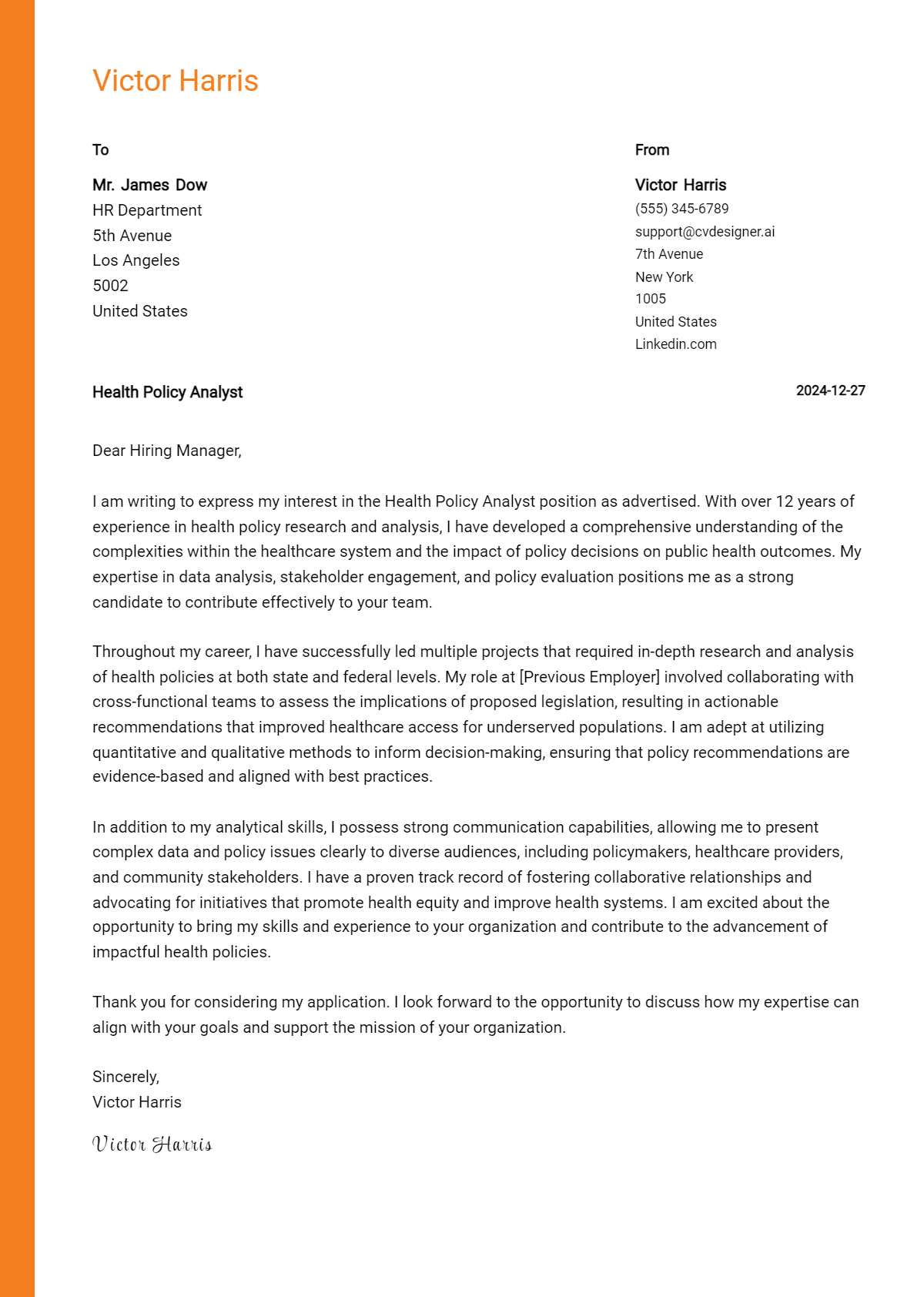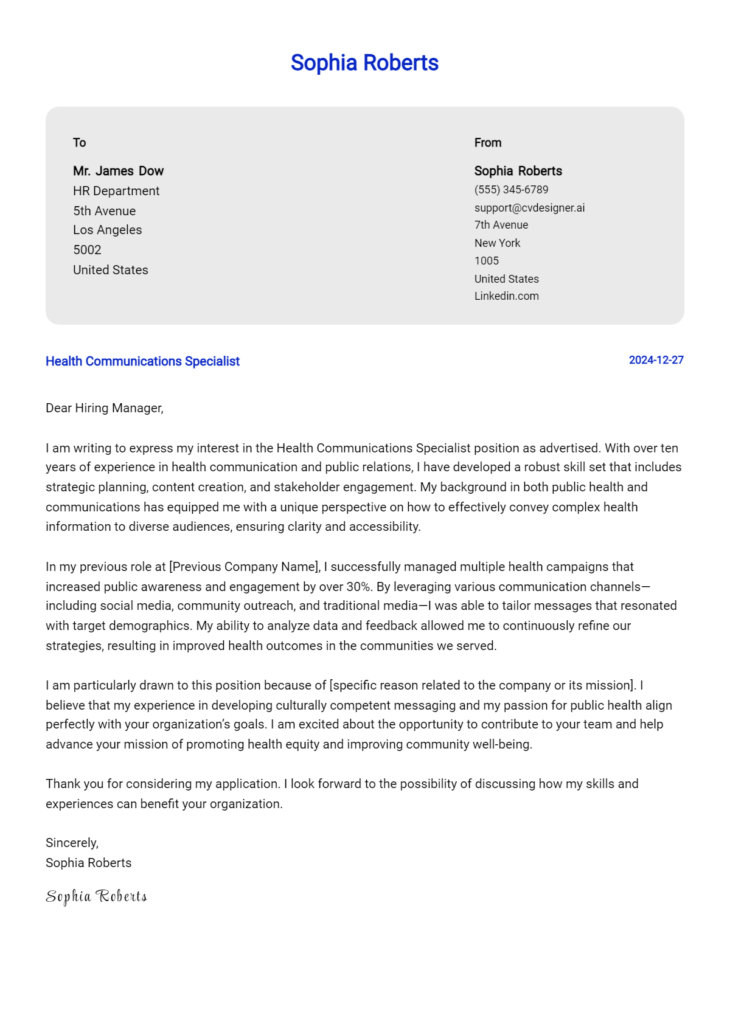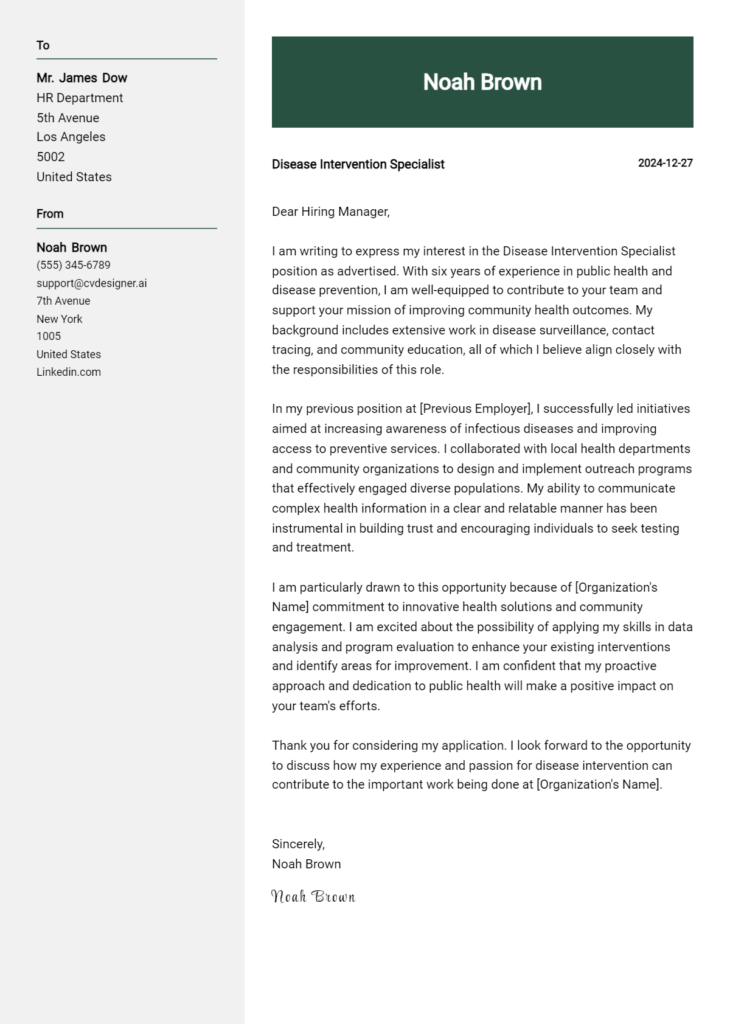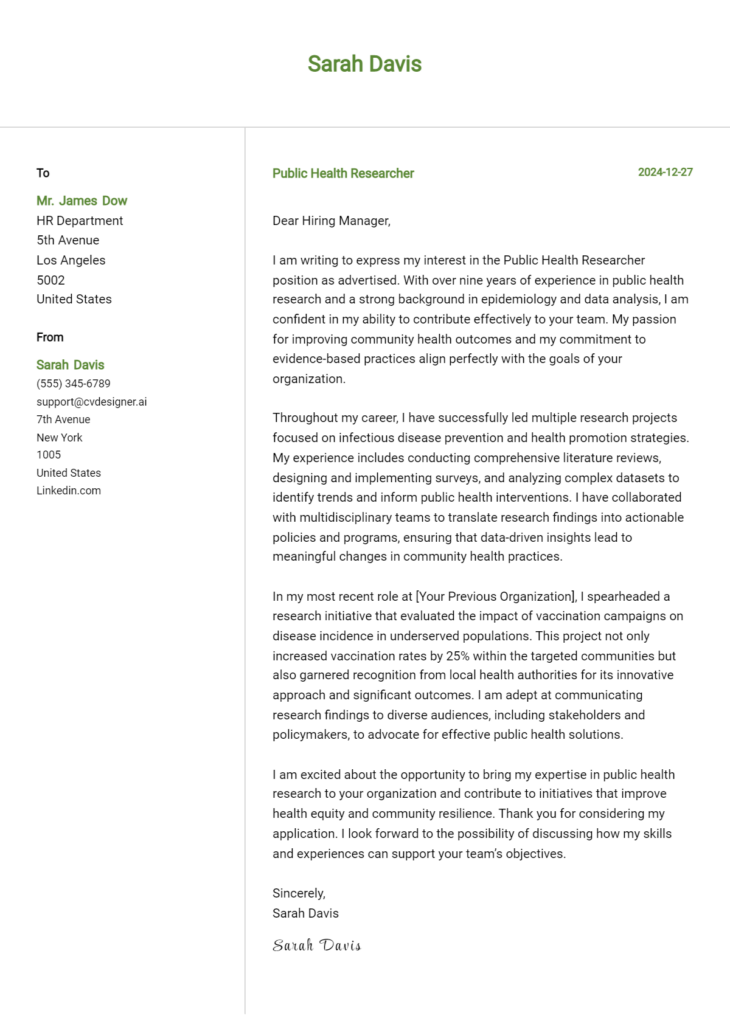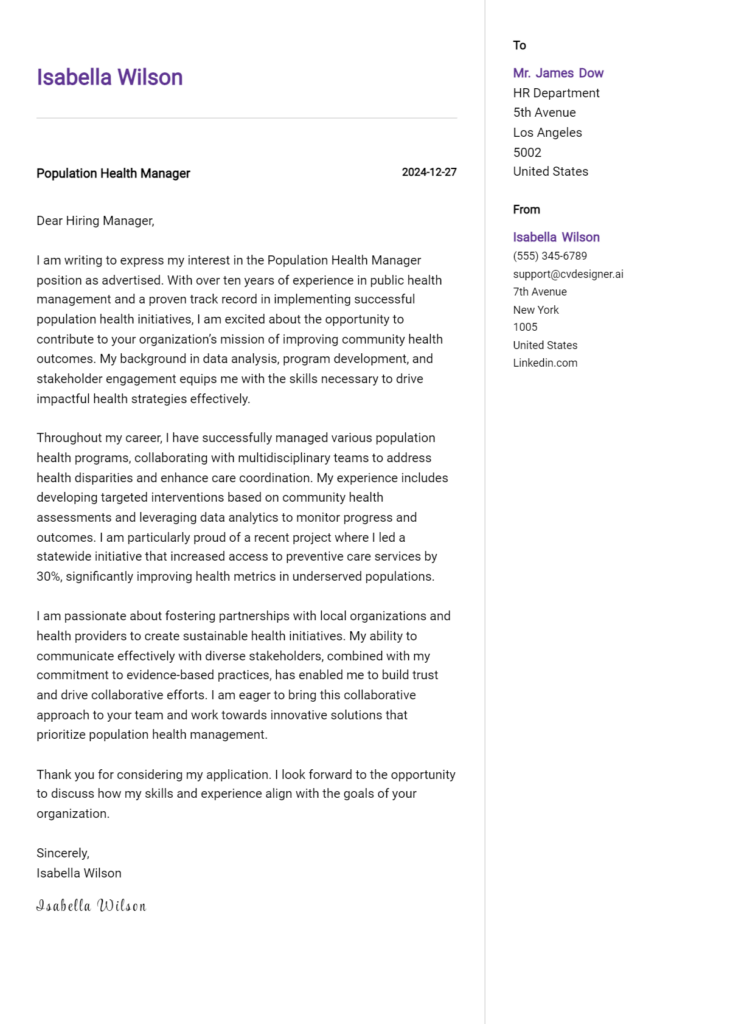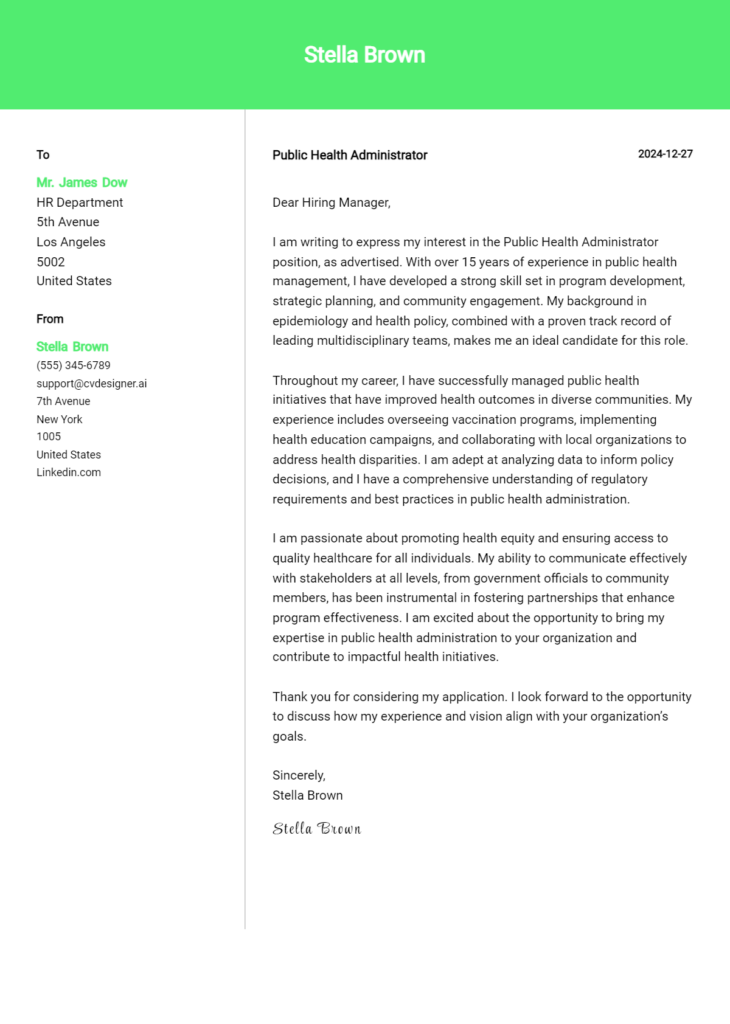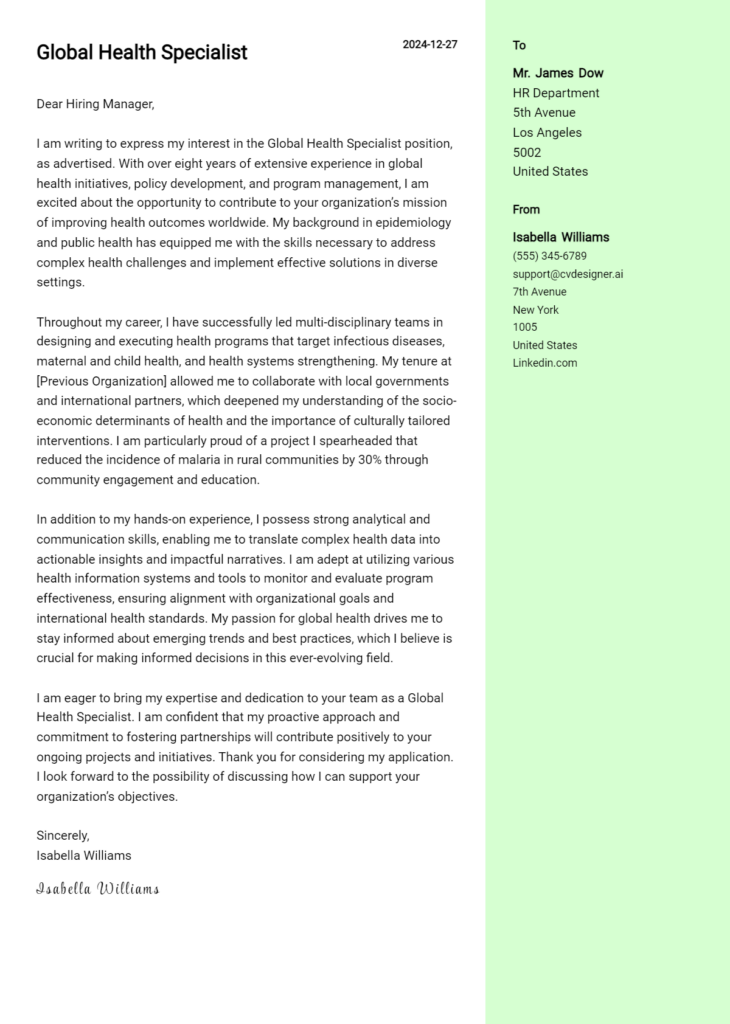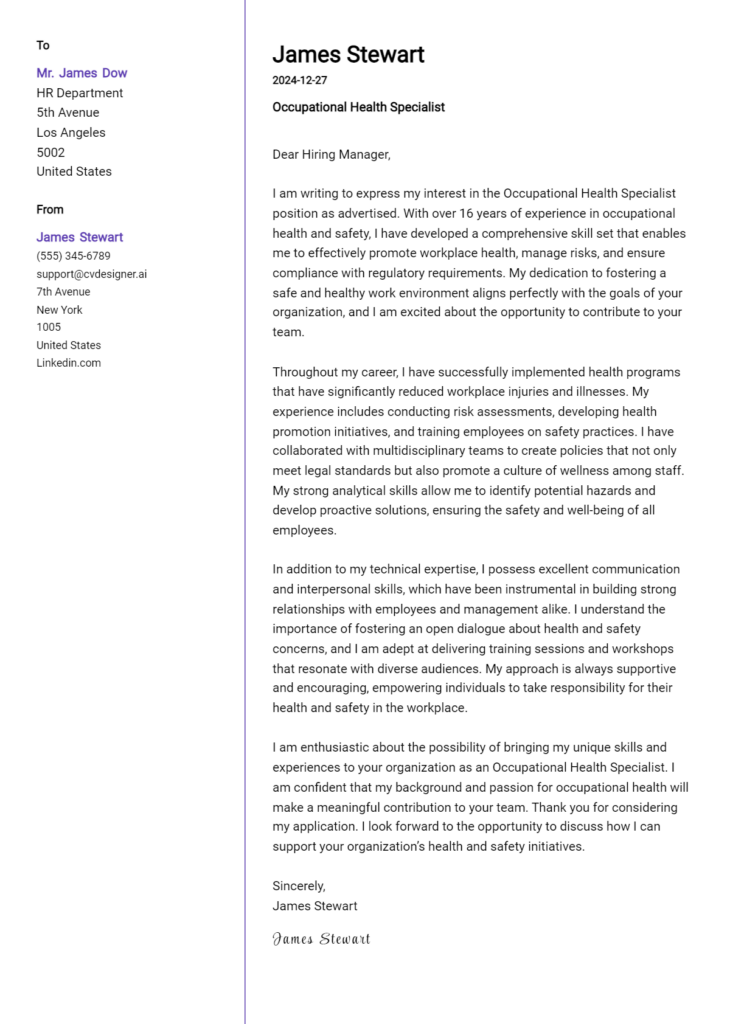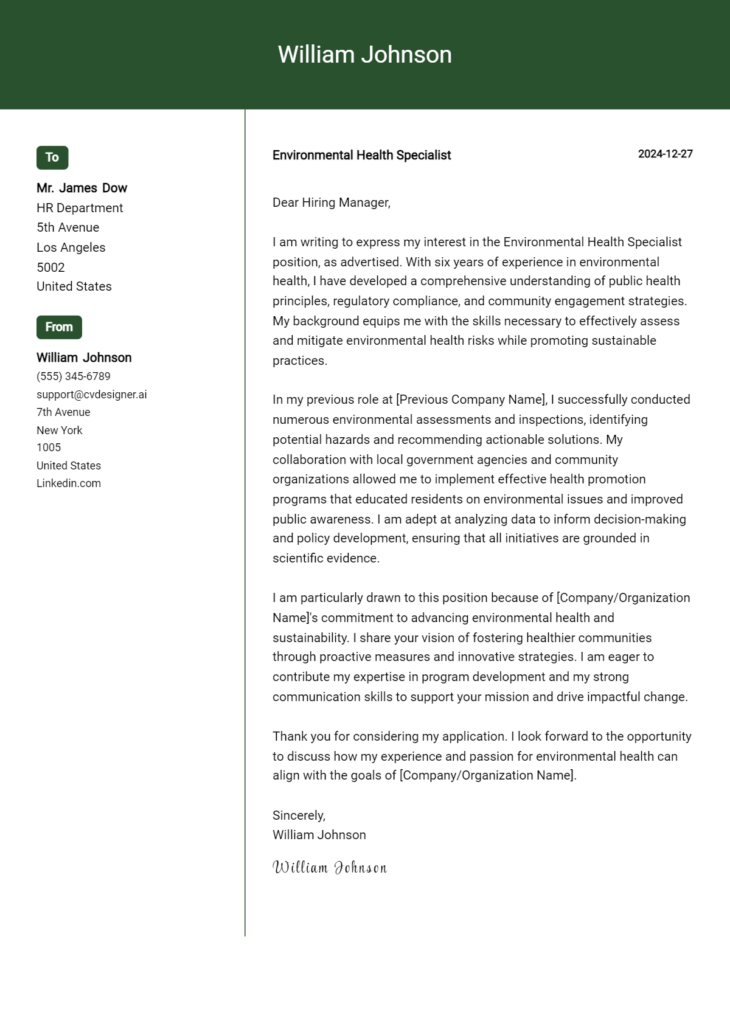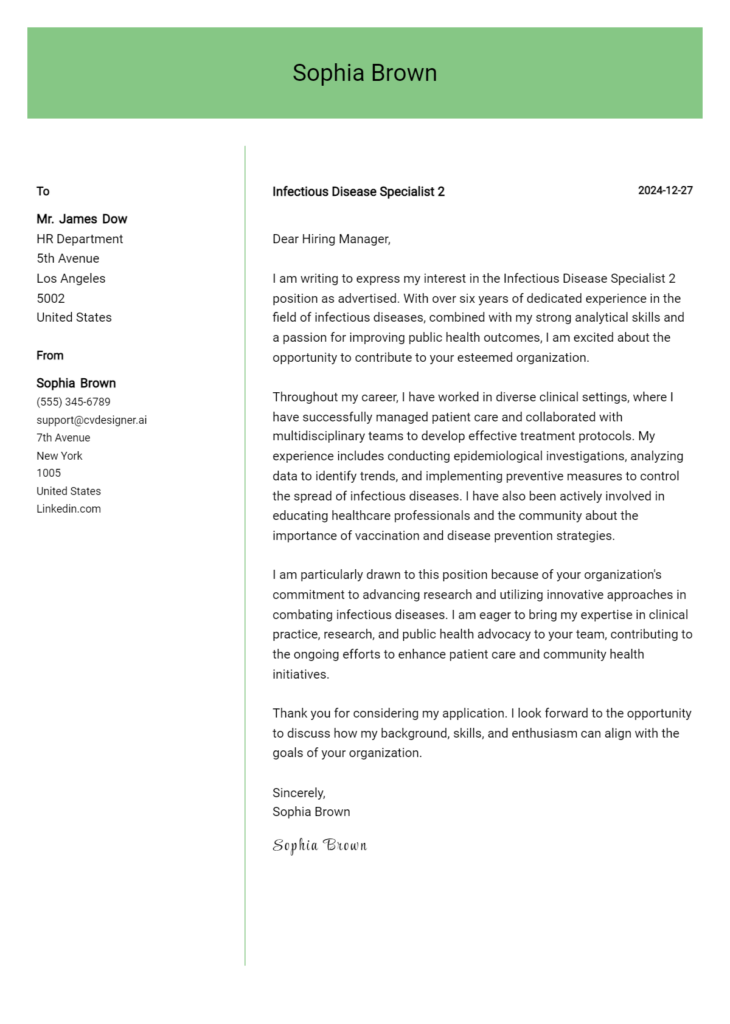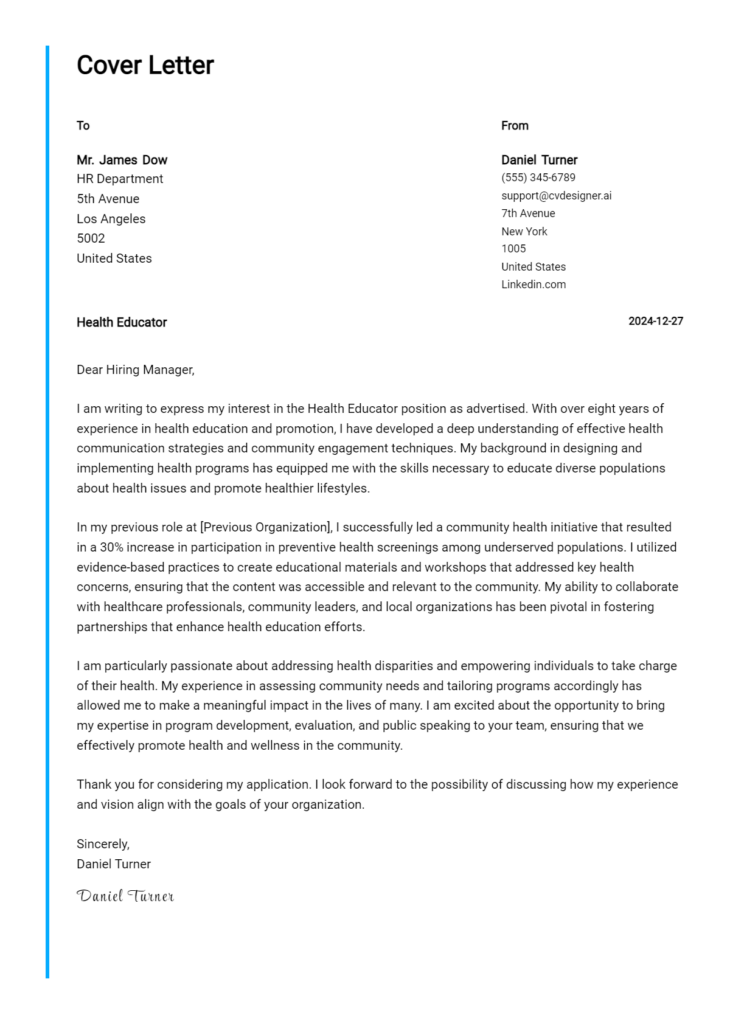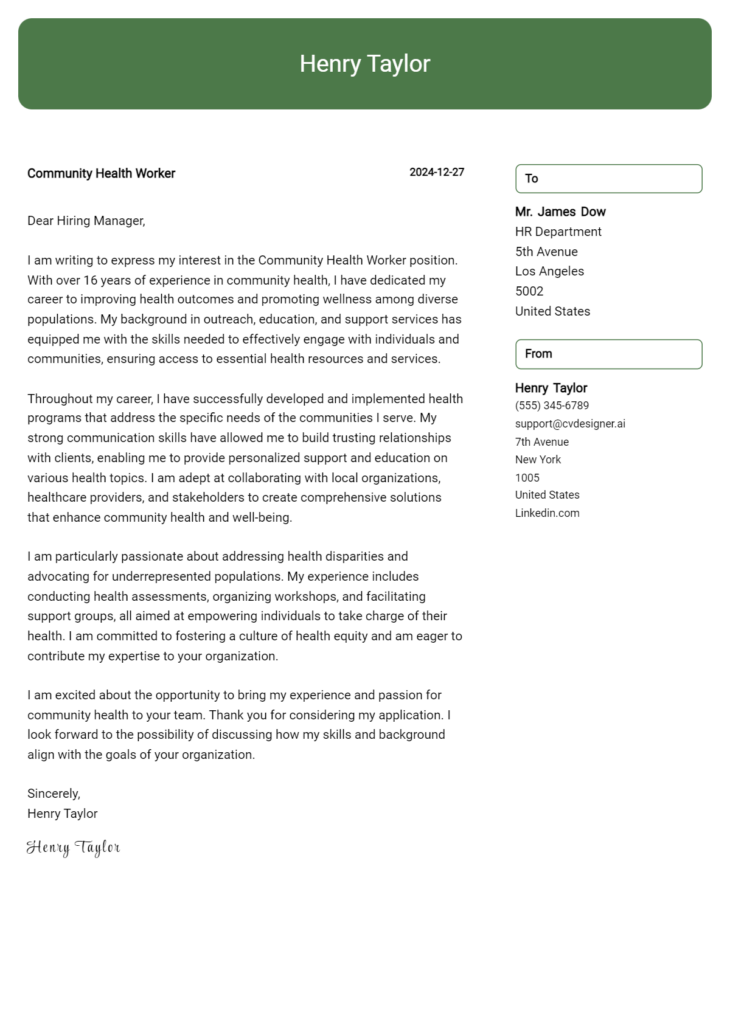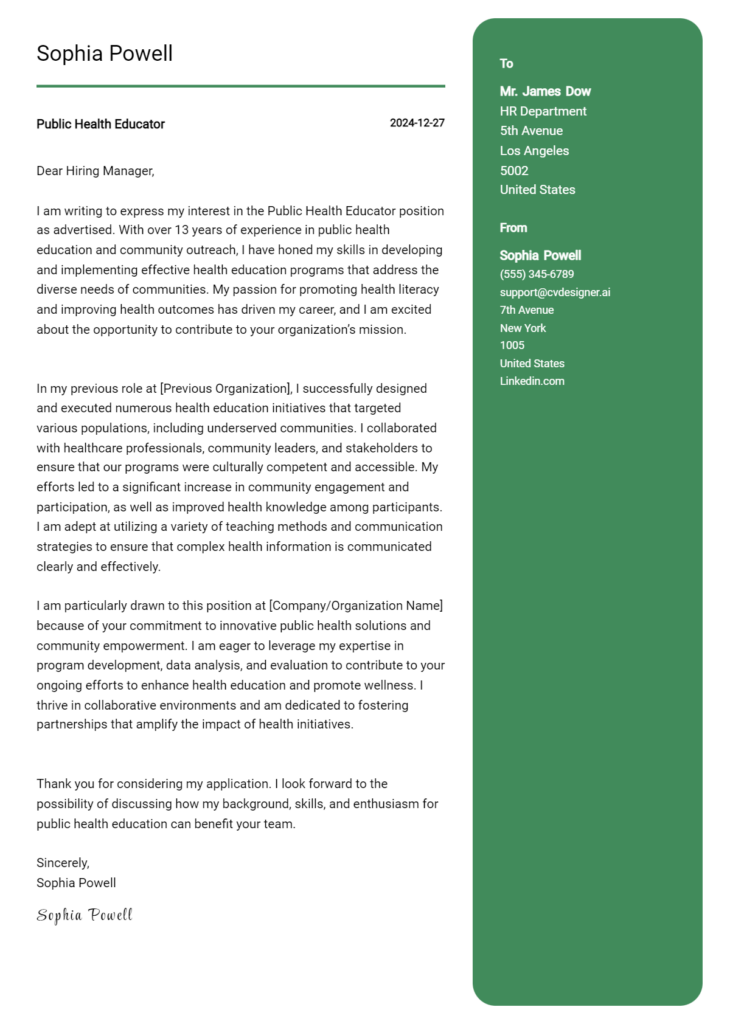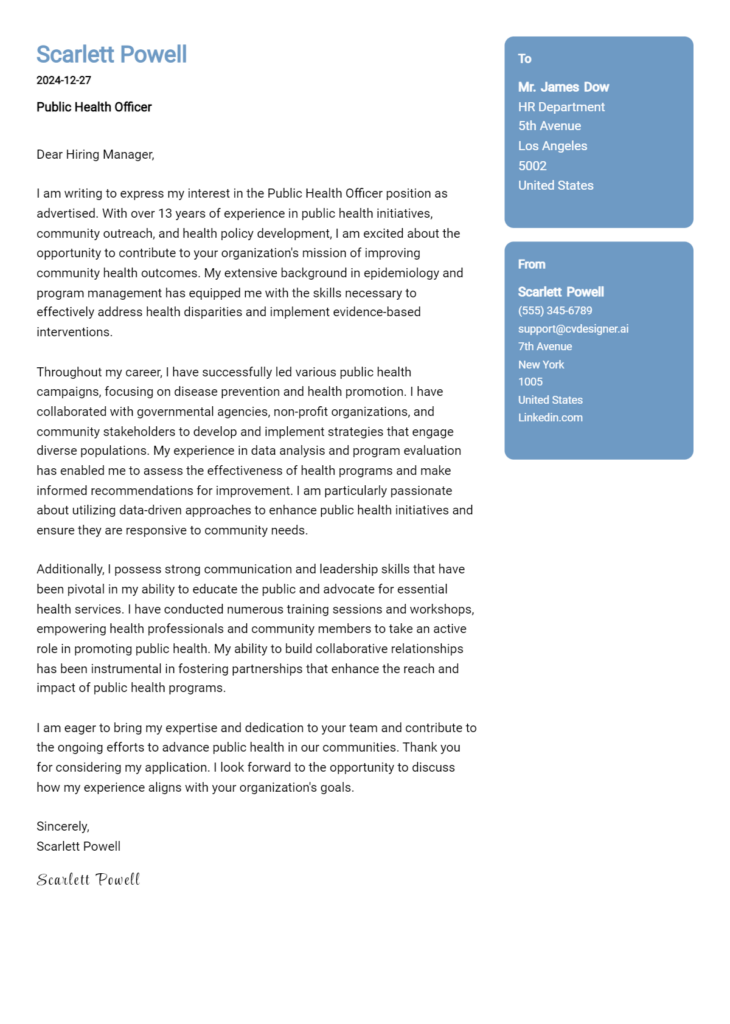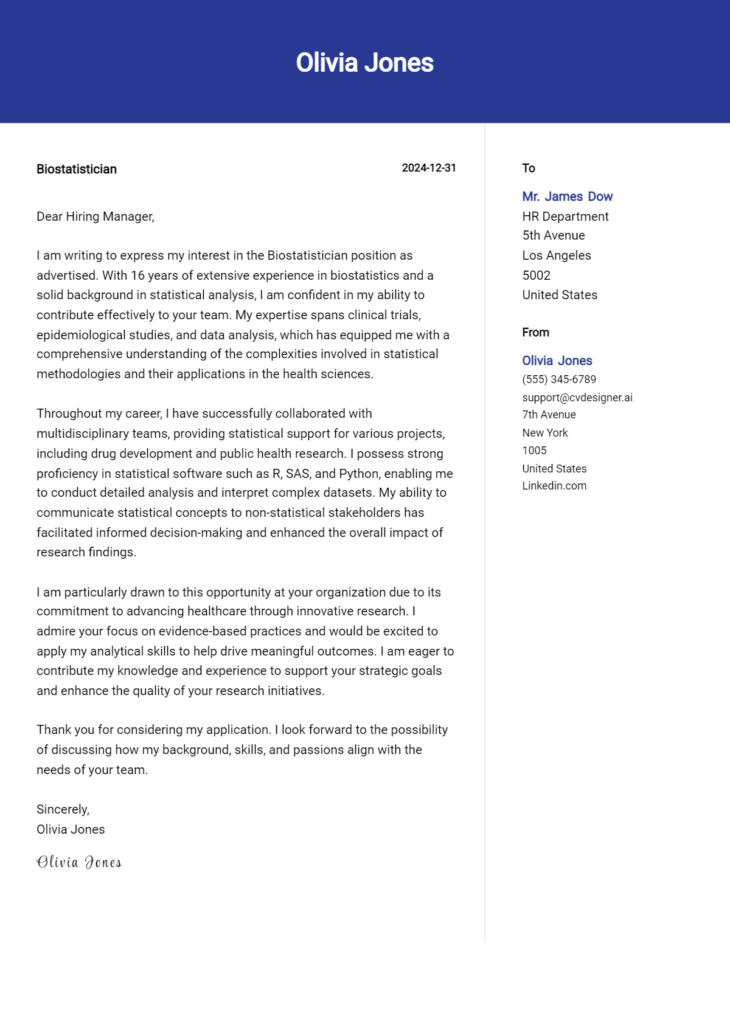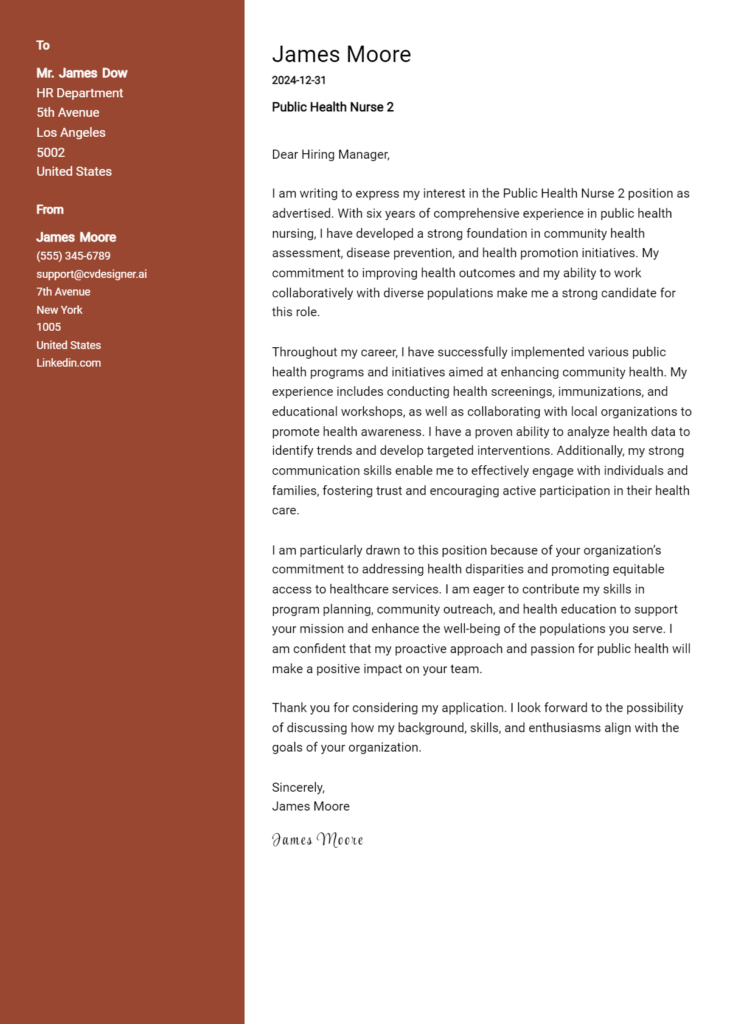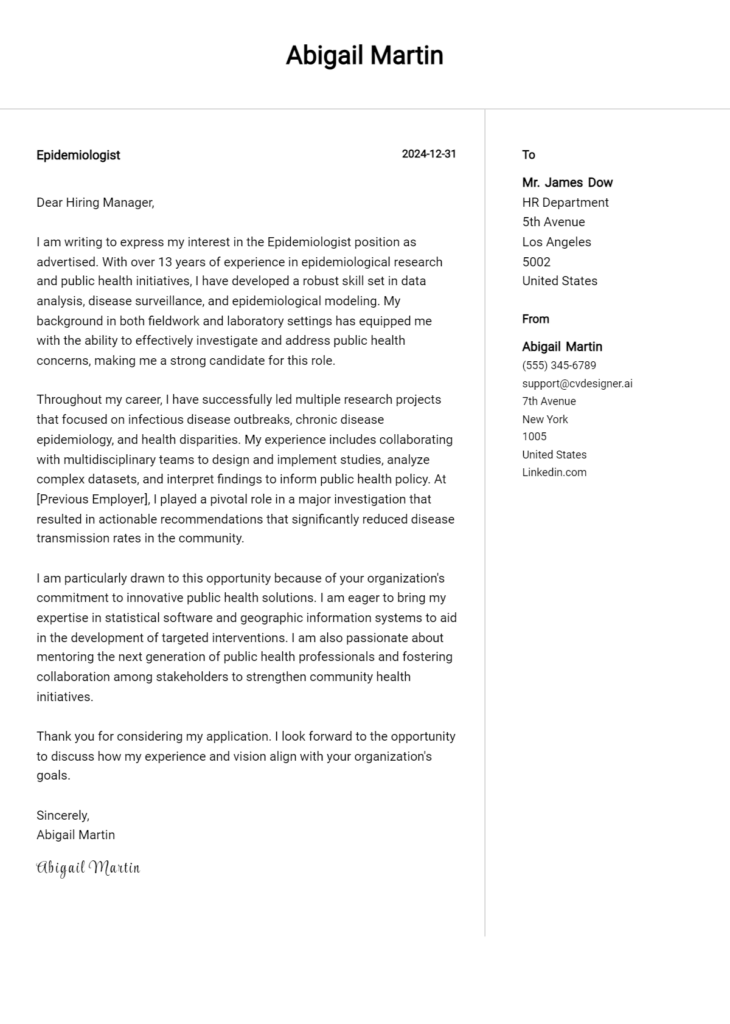Health Policy Analyst Cover Letter Examples
Explore additional Health Policy Analyst cover letter samples and guides and see what works for your level of experience or role.
How to Format a Health Policy Analyst Cover Letter
Crafting a compelling cover letter is essential for a Health Policy Analyst, as it serves as your first opportunity to make a strong impression on potential employers. Proper formatting not only highlights your qualifications but also demonstrates your analytical abilities and attention to detail—qualities that are paramount in the field of health policy. An effectively structured cover letter can set you apart from other candidates by clearly presenting your skills and experiences in a professional manner.
In this guide, we will outline the key components of a well-organized cover letter, providing insights and examples tailored for Health Policy Analysts.
We'll focus on the essential sections of a professional cover letter, including:
- Cover Letter Header
- Cover Letter Greeting
- Cover Letter Introduction
- Cover Letter Body
- Cover Letter Closing
Each section plays a crucial role in showcasing your qualifications and professionalism. Let’s break down each part to ensure your Health Policy Analyst cover letter stands out in a competitive job market.
Importance of the Cover Letter Header for a Health Policy Analyst
The cover letter header is a vital component of any professional correspondence, particularly for a Health Policy Analyst. It serves as the first impression of your application and sets the tone for the rest of your letter. A well-organized header should include your contact information, the date, and the recipient's details, ensuring clarity and professionalism. This information helps the hiring manager quickly identify who you are and how to reach you, which is essential in the competitive field of health policy. A strong header not only reflects your attention to detail but also demonstrates your understanding of formal communication.
Strong Example
Jane Doe 123 Health Lane Policy City, ST 12345 janedoe@email.com (123) 456-7890 October 1, 2023 Mr. John Smith Hiring Manager Health Policy Institute 456 Policy Blvd Health Town, ST 67890
Weak Example
jane doe 123 health lane policy city, st 12345 janedoe@email.com October 1st, 2023 Mr. J. Smith
The Importance of the Cover Letter Greeting
The greeting of a cover letter is crucial as it sets the tone for the entire document and serves as the first impression on the hiring manager. A well-crafted greeting not only demonstrates professionalism but also adds a personal touch by addressing the recipient directly. This simple act shows that you have taken the time to research and engage with the organization and its personnel, which can significantly elevate your candidacy. To make a strong impact, avoid generic greetings like "To Whom It May Concern" and instead aim to find the hiring manager's name through LinkedIn, the company's website, or by calling the office if necessary.
Here are some strong and weak examples of greetings for a Health Policy Analyst cover letter:
Strong Example
Dear Dr. Emily Johnson,
Weak Example
To Whom It May Concern,
The Importance of a Strong Cover Letter Introduction for a Health Policy Analyst
A well-crafted cover letter introduction is crucial for a Health Policy Analyst role, as it serves as the first impression for the hiring manager. This opening paragraph must not only capture attention but also convey genuine interest in the position and hint at the candidate’s relevant skills or achievements. A strong introduction sets the tone for the rest of the letter, compelling the reader to learn more about the applicant. Conversely, a weak introduction may fail to engage the hiring manager, leaving them uninterested in the candidate's qualifications. Below are examples that demonstrate the difference between a strong and a weak cover letter introduction.
Strong Example
Dear [Hiring Manager's Name], I am excited to apply for the Health Policy Analyst position at [Company Name], as advertised on [Job Board/Website]. With over five years of experience in health policy research and a Master's degree in Public Health, I have successfully contributed to policy initiatives that improved healthcare access for underserved populations. My analytical skills, combined with my dedication to evidence-based policymaking, make me a perfect fit for your team, and I am eager to bring my expertise to [Company Name].
Weak Example
To Whom It May Concern, I am writing to apply for the Health Policy Analyst job. I saw the job posting online and thought it would be a good opportunity. I have some experience in the field and a degree, which I think might be useful. I hope you consider my application.
Purpose of the Cover Letter Body for a Health Policy Analyst
The body of a cover letter for a Health Policy Analyst serves as a critical space for candidates to articulate their relevant skills, experiences, and the unique value they bring to the organization. It allows applicants to connect their academic background, professional experiences, and specific accomplishments to the job requirements outlined in the job description. By highlighting successful projects, such as a policy analysis that resulted in improved health outcomes or a collaborative initiative that influenced legislative changes, candidates can demonstrate their analytical capabilities and commitment to health policy. This section should effectively convey the applicant's expertise in research, data analysis, and stakeholder engagement, establishing a compelling case for why they would be a valuable addition to the team.
Strong Example
Dear [Hiring Manager's Name], I am writing to express my interest in the Health Policy Analyst position at [Company Name]. With over five years of experience in health policy research, I successfully led a project that analyzed the impact of Medicaid expansion in our state, which ultimately contributed to a 15% increase in healthcare access for low-income families. My role involved collaborating with state agencies and community organizations, allowing me to hone my skills in stakeholder engagement and policy advocacy. Additionally, my recent publication in the Journal of Health Policy highlighted innovative strategies for reducing health disparities, showcasing my commitment to evidence-based policymaking. I am eager to bring my data-driven approach and proven track record to [Company Name] and contribute to shaping effective health policies that benefit our communities. Sincerely, [Your Name]
Weak Example
Dear [Hiring Manager's Name], I am interested in the Health Policy Analyst job at [Company Name]. I have worked in health policy for a while and have done some research. I think I would be a good fit for the team. I have contributed to various projects, and I like to help people. I believe that my experience could be helpful in this role. I look forward to discussing this position further. Best, [Your Name]
Importance of the Cover Letter Closing for a Health Policy Analyst
The closing paragraph of a cover letter is crucial as it serves as the final opportunity to leave a lasting impression on the hiring manager. For a Health Policy Analyst, this section should effectively summarize qualifications, reiterate genuine interest in the position, and encourage the next steps, such as reviewing the resume or scheduling an interview. A strong closing reinforces the candidate's fit for the role and leaves the reader with a sense of enthusiasm about the possibility of collaboration. In contrast, a weak closing may diminish the impact of the entire letter, leaving the hiring manager unimpressed or uncertain about the candidate's motivation.
Strong Example
Thank you for considering my application for the Health Policy Analyst position. With my extensive experience in health policy research, data analysis, and stakeholder engagement, I am confident in my ability to contribute effectively to your team. I am genuinely excited about the opportunity to support your organization's mission to improve health outcomes. I look forward to the possibility of discussing my application further and am eager to provide additional insights into how I can add value to your team. Please feel free to reach out to schedule an interview at your convenience.
Weak Example
I hope you like my application. I think I would be okay at the Health Policy Analyst job. If you want to talk, just let me know. I'm looking forward to your reply.
These tips will assist candidates in crafting an effective cover letter for a Health Policy Analyst position. A well-written cover letter is crucial in distinguishing yourself from other applicants, especially in a field that requires a unique blend of technical expertise and analytical skills. It’s important to showcase not only your problem-solving abilities and knowledge of the Software Development Life Cycle (SDLC), but also your ability to work collaboratively in a team environment and your commitment to continuous learning. Here are five detailed tips to help you present your qualifications effectively:
Tips for Writing an Effective Cover Letter for a Health Policy Analyst
Highlight Technical Skills: Emphasize your technical skills relevant to health policy analysis, such as proficiency in data analysis software (e.g., SAS, R, or Python). Provide specific examples of how you have used these tools to analyze health data, interpret findings, and inform policy decisions. This will demonstrate your capability to handle the technical aspects of the role.
Showcase Problem-Solving Abilities: Illustrate your problem-solving skills by sharing a specific scenario where you identified a health policy issue and proposed a solution. Explain the process you followed, the outcome of your actions, and how it benefited the organization or community. This narrative will showcase your analytical thinking and proactive approach.
Demonstrate SDLC Knowledge: If you have experience working within the Software Development Life Cycle, mention it clearly. Discuss your role in any health informatics projects, particularly how you contributed to different phases of the SDLC, such as requirements gathering, system design, or testing. This knowledge is crucial in modern health policy analysis and will set you apart from other candidates.
Emphasize Teamwork: Health policy analysis often involves collaboration with various stakeholders. Provide examples of how you have worked effectively in team settings, particularly with interdisciplinary groups. Highlight your role in facilitating discussions, sharing insights, and achieving collective goals, showcasing your ability to communicate and collaborate effectively.
Express a Passion for Continuous Learning: The field of health policy is ever-evolving, and a commitment to continuous learning is essential. Mention any relevant certifications, workshops, or courses you have completed to stay updated on health policy trends and developments. Additionally, you could express your interest in attending future seminars or pursuing advanced degrees, demonstrating your dedication to professional growth.
By following these tips, you can create a compelling cover letter that highlights your qualifications and positions you as a strong candidate for a Health Policy Analyst role. For additional assistance, consider using cover letter templates or a cover letter builder to streamline the creation process.
Common Mistakes to Avoid in a Health Policy Analyst Cover Letter
Crafting a compelling cover letter is essential for standing out as a Health Policy Analyst. Avoiding common mistakes can significantly enhance your chances of making a positive impression. Here are some frequent pitfalls and tips on how to sidestep them:
Generic Greetings: Addressing your cover letter with "To whom it may concern" can make it seem impersonal. Research the hiring manager's name to create a more tailored introduction.
Lack of Specificity: Failing to mention specific skills or experiences related to health policy can weaken your application. Use concrete examples that highlight your expertise in areas like legislation, public health initiatives, or data analysis.
Overly Formal Language: While professionalism is important, using overly complex language can make your letter difficult to read. Aim for a clear, concise writing style that reflects your personality.
Neglecting the Job Description: Not aligning your cover letter with the job posting can lead to missed opportunities. Identify key responsibilities and required skills in the job description, and incorporate them into your letter.
Ignoring Formatting Guidelines: Poor formatting can detract from your message. Follow proper cover letter format to ensure your letter is visually appealing and easy to navigate.
Failing to Proofread: Spelling and grammatical errors can undermine your credibility. Take the time to proofread your letter or have someone else review it for clarity and correctness.
Not Including a Call to Action: Omitting a closing statement that invites further discussion can leave your letter feeling incomplete. Conclude with a proactive statement expressing your interest in discussing your application further.
For inspiration, you can check out these cover letter examples to see how to effectively communicate your qualifications and avoid common pitfalls.
Cover Letter FAQs for Health Policy Analyst
What should I include in my cover letter for a Health Policy Analyst position?
In your cover letter, include a strong introduction stating your interest in the Health Policy Analyst position and how your background aligns with the job requirements. Highlight your relevant education, such as a degree in public health, health policy, or a related field. Discuss your experience with policy analysis, research, or data evaluation, showcasing specific projects or achievements that demonstrate your analytical skills. Emphasize your understanding of current health policies and your ability to communicate complex information effectively. Finally, express your enthusiasm for the organization and how you can contribute to its mission.
How can I demonstrate my analytical skills in the cover letter?
To effectively demonstrate your analytical skills, provide specific examples from your past experiences. Discuss a project where you analyzed health data or conducted research that led to actionable policy recommendations. Use metrics to quantify your achievements, such as improved health outcomes or successful implementation of policy changes. Describe the methodologies you employed, such as statistical analysis, qualitative assessments, or stakeholder engagement. Show how your analytical skills have directly impacted health policy decisions or program improvements, emphasizing your ability to think critically and solve problems in a health policy context.
Should I tailor my cover letter for each application?
Yes, tailoring your cover letter for each application is crucial. A customized cover letter demonstrates your genuine interest in the specific position and organization. Research the organization’s mission, values, and recent projects, and reflect this understanding in your cover letter. Use specific language from the job description to highlight how your skills and experiences align with the requirements. By personalizing your cover letter, you can stand out from other candidates and show that you are proactive and detail-oriented, which is essential in a Health Policy Analyst role.
How long should my cover letter be?
Your cover letter should typically be one page in length, consisting of three to four paragraphs. Aim for around 250 to 400 words. This length allows you to convey your qualifications and enthusiasm without overwhelming the reader. Be concise and focused, using clear language to articulate your points. Avoid unnecessary jargon or lengthy explanations—stick to relevant experiences that directly relate to the Health Policy Analyst role. A well-structured cover letter, with a clear introduction, body, and conclusion, will make a strong impression while respecting the hiring manager's time.
Build your Cover Letter in minutes
Use an AI-powered cover letter builder and have your letter done in 5 minutes. Just select your template and our software will guide you through the process.

